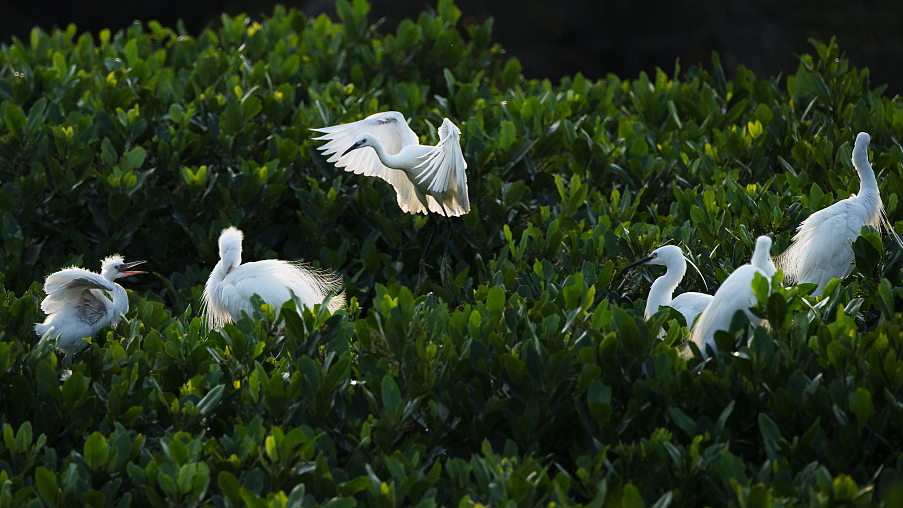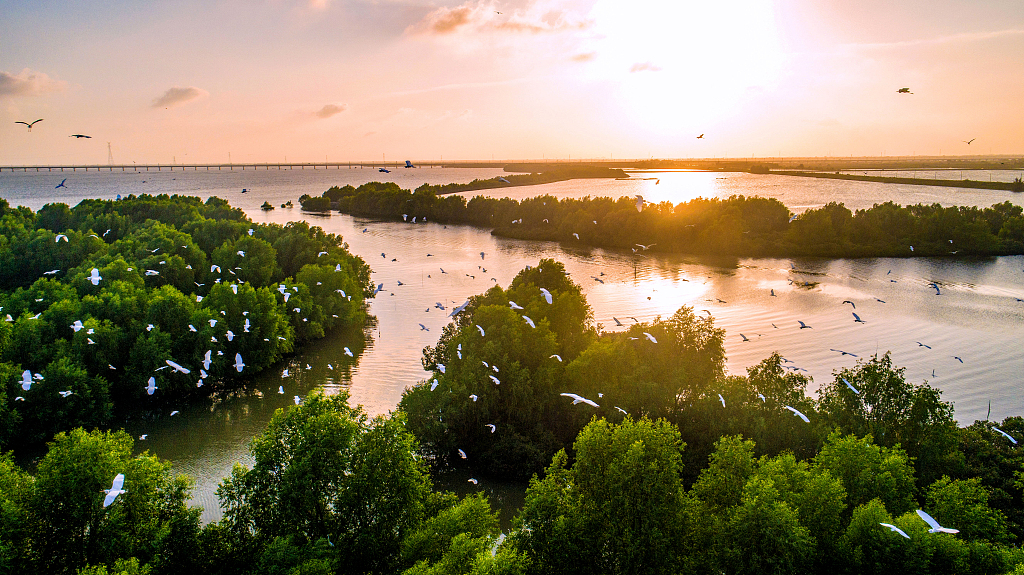
Officials of Zhanjiang, a coastal city in western Guangdong Province, vowed to protect its mangrove forests to better build "a city of mangroves" and engage in green development following the visit of Chinese President Xi Jinping on Monday.
"Over the past 20 years, we have planted about 1,500 hectares of mangrove trees. The expanded mangrove forests provide broader living space for more creatures. The bird survey in 2002 showed there were only 194 species of birds in the area. The latest bird survey reported that we now have 312 species of birds in Zhanjiang. With the improvement of the ecological environment, more creatures choose to live in Zhanjiang, especially in mangrove forests," said Zhang Wei, deputy director of Guangdong Zhanjiang Mangrove National Nature Reserve Administration.
The Zhanjiang Mangrove National Nature Reserve is the biggest single mangrove forest in China. It is not only home to flocks of migratory birds all year round, but also a paradise for fish, shrimp, crab and shellfish.
In recent years, the city of Zhanjiang has been stepping up efforts to build "a city of mangroves." The city has protected and restored the mangrove ecosystem, promoted the deep integration of mangrove ecological protection with coastal tourism, tourism agriculture, recreational fishery and other forms of business, and strived to create high-quality "green engines" for development.

"As an ecological and environmental protection specialist, I feel a great responsibility. We are actively exploring the system and mechanism to develop the ecological value of mangroves, to make full use of the carbon sink of mangroves, and to develop the under-forest economy of mangroves to provide more eco-tourism experience for citizens. We can imagine a harmonious scenery of humans and nature where tourists visit the mangrove forests with migratory birds flying around," said Guan Hui, director of the Ecology and Environment Bureau in Zhanjiang.
Zhang said the changing ecological environment has encouraged more and more residents to actively take part in the efforts of building "a city of mangroves."
"In the process of building 'a city of mangroves,' more and more residents voluntarily join in the efforts of protecting the mangrove forests. Particularly in recent years, more and more people can walk in the mangrove forests to enjoy the fresh air. I think with the better protection of mangroves, the better ecological environment, the more beautiful scenery, people will have a greater sense of happiness," said Zhang.
Mangrove forests mostly grow in tropical and subtropical intertidal zones and are regarded as a typical part of the marine ecosystem, and are as important as coral reefs, salt marshes and seagrass beds.
Thanks to their important roles in various aspects of marine ecosystem conservation, such as seawater purification, disaster prevention and dissipation of winds and waves, carbon sequestration and storage, as well as biodiversity maintenance, mangrove forests are praised as "coast guards" and "green lungs of the ocean."
Chen Zheng, chief of the CPC branch of Mazhang District, said they will make concrete efforts to protect the "gift of nature," the mangroves.
"We will raise public awareness of mangroves protection and the rightful use of the sea, and vigorously promote the restoration and afforestation of mangroves to protect this gift of nature," said Chen.
(If you want to contribute and have specific expertise, please contact us at nature@cgtn.com.)